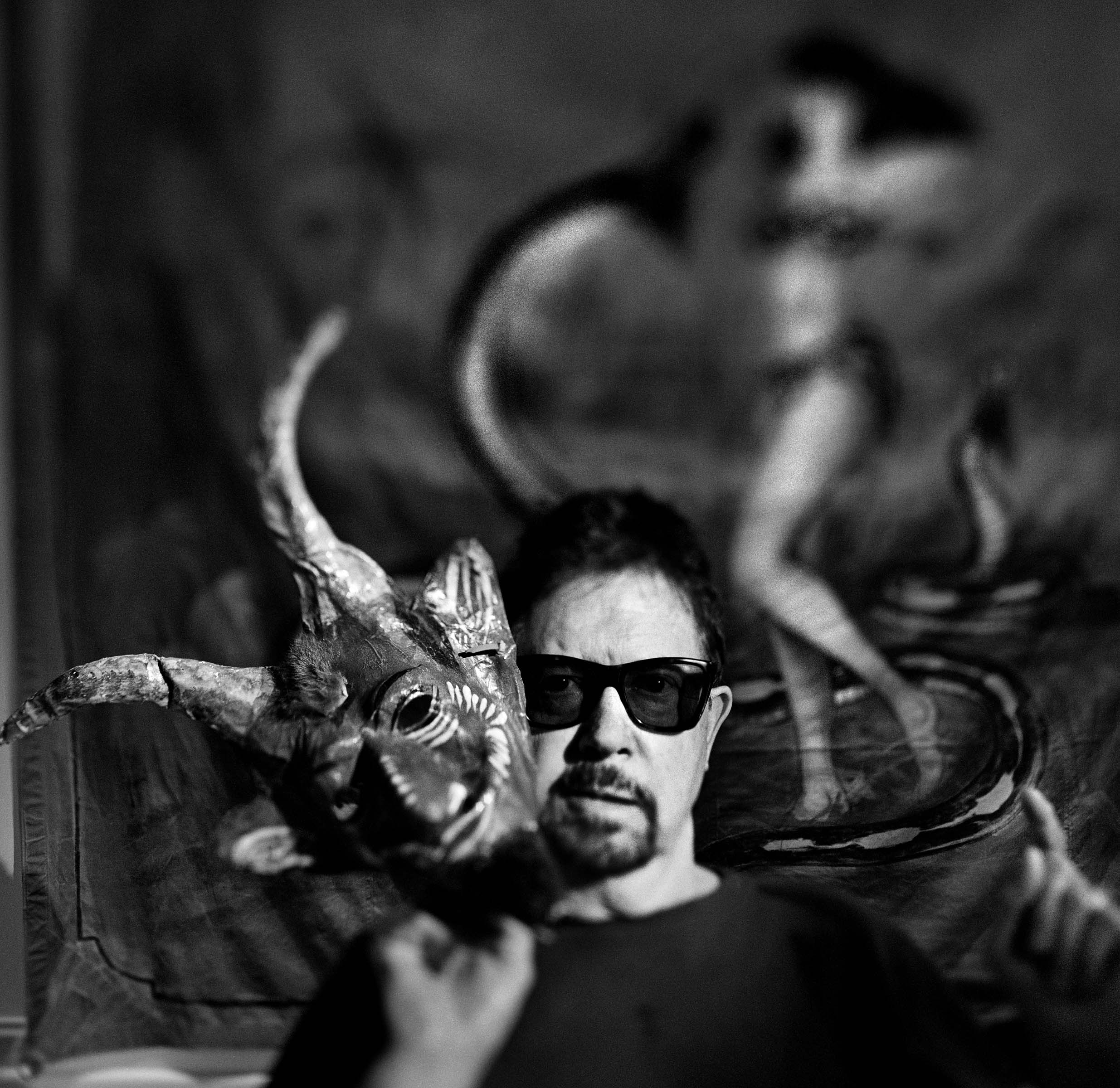Tom Robbins, bestselling author of nine perennially popular novels, as well as a book of short writings and a recent memoir, has been called everything from “Mark Twain with an illegal smile” to “the most dangerous writer in the world.” Most recently, he’s collaborated on a musical adaptation of one of his novels (the soundtrack of which was released on October 12, with vocal talent that includes Jon Cryer and Belinda Carlisle, among others).
I caught up with him to hear more about this project, and found him as nimble as ever as we wound up in a wide-ranging conversation about storytelling, God, creativity, language, laughter, and politics. What follows is Part 1 of a 2-part interview (read part 2 here):
Tony Vigorito: I read in Billboard that you’ve written a play for musical theater. And you haven’t published a novel in several years. So tell me, how did this play come about, and have you given up the page for the stage?
Tom Robbins: Here’s what happened. A few years ago, leafing through an issue of The New Yorker, I came upon a cartoon depicting two men in a bar. The elder of the two, nursing a martini, wore a suit, tie, and conservative spectacles: the image of a publisher. The other guy — disheveled, bearded, a bit wild of eye as he looked up from a pint — was obviously a writer. In the caption, the publisher was saying to the writer, “Sorry, I don’t think a children’s book about beer would sell.”
Other readers doubtlessly smiled, even chuckled, and turned the page. I, however, took it as a challenge. My B Is for Beer, published by HarperCollins Ecco, actually sold quite well, though I’d wager no child has ever read it. Eventually, to my surprise, the Australian singer/songwriter Ben Lee came to me with the crazy idea of turning the B Is for Beer novel into a musical for the stage.
I wrote the script and a few of the lyrics, Ben wrote the music and most of the lyrics. There was a great workshop production at the Largo in Los Angeles, much laughter and applause, but so far Broadway has not come calling. And neither have I “retired” as a novelist, although at age 86, I’m unsure how much literary mustard I’ll still be cutting.
I’m certain I’m not the only reader relieved to hear that rumors of your retirement have been greatly exaggerated. So let me ask you this: As a world-class storyteller, I imagine you’ve grown sensitive to the manner in which story moves the human experience, the manner in which we are conscripted into largely unconscious narratives that more or less determine our decisions. A wide-open child is told who they are and what they believe, and they act according to the script into which they’ve been cast.
That said, it has become agonizingly clear that the story into which we were born harbors no reservations against undermining the planetary ecosystem that sustains us. So — if you’ll forgive the vastness of this question — how might we revise the story we’ve inherited? Or more to the point, what would a new story of the human experience look like?
We homo sapiens have likely always defined ourselves through narration. In the mouths of firelit caves, on the banks of starlit rivers, we self-consciously sought to understand the world and our place in it by means of stories. It would have been only a matter of time, however, before mere social comprehension was insufficient, we longed to excite and amuse one another by inventing scenarios that exceeded in novelty and scope any observable real-life events.
Once imagination entered the picture, there seemed no limits to prehistoric story time. We could tell tales that illuminated our hidden psyche, the universe, the cosmos, the secret lives of trees and animals. Eventually we learned how to make the tales more permanent by writing them down.
When television first became ubiquitous, many worried that it would destroy imagination. Today, there’s similar concern about the Internet — and that’s a legitimate issue, if only because social media is to the human ego what a pile of red meat is to a hungry wolf. Evidence of exploding narcissism is everywhere, from the pathological occupant of the White House to intrusive audiences at concerts and radio quiz shows. Online, with such easy access to a wide audience, everybody and his sister with a keyboard seems to want a piece of the spotlight, regardless if they have any talent or have paid any dues. It may be a case of democracy swallowing its own tail.
Let’s not fret. The fact is, creative imagination has always been a rare commodity: the province, the gift of singular individuals working on the fringes of a society with which it frequently is at odds. Somebody somewhere is probably already creating the stories that open wider our eyes to the natural world, to the planetary mother we are raping in her kitchen.
However — and this is essential — it won’t be by faithfully dramatizing the ins and outs of environmental politics, or recasting the ideas of God-given human superiority perpetuated by Old Testament mythology, but, rather, by creating prose so vivid it lights up a page like a Maui sunset, sentences so linguistically evocative they cause the reader to taste wild strawberries, to hear the confused grunting of large beasts at a dried-up waterhole. Our human world is made of language as surely as our planetary world is made of stone and water, and the writing that really matters is that whose imagery is capable of ripping through the beige curtain that too often separates the written word from reality, not to mention wonder. Style, baby, style!
And in the new story, we will be favored by God no more, no less, than that strawberry plant, that thirsty rhinoceros. Which does not mean, however, that there won’t be plenty of laughs. And plenty of sex.
Your answer invites ever-vaster vistas: God, creativity, language, laughter, etc. Naturally, these are interrelated and we needn’t necessarily choose between them, but let’s start, shall we say, in the beginning: Why do you think there is something rather than nothing? Is the cosmos, as John Updike speculated shortly before his death, “a piece of light verse” tossed off by a bored and lonely God? And while we’re at it, what are we referring to with this syllable of God?
The most simple (and perhaps most accurate) answer is that “God” is the face we paint on the Mystery — as if giving the Mystery anthropomorphic (if super radiant) features will make it seem, well, less Mysterious.
Early in Levantine history, remember, the divine face was collectively, predominately feminine. That is to say, the gal-axy of super beings our pre-biblical ancestors believed orchestrated almost every aspect of existence were goddesses. It wasn’t until the patriarchal revolution in the southeastern Mediterranean region about 4,000 years ago that male leaders, fed up with feminine dominance both in the heavens and in the bed (“Hey you with your multiple orgasms! Am I really the father of that baby boy who is to inherit my flocks and my land?”) conspired to create a monotheistic deity — and give it a sex change. (“Goodbye Ishtar. So long Astarte. Hello Jehovah.”)
Regardless of gender (if any), the Mystery remains. Why is there something instead of nothing? Is there some conscious force, some higher power in the cosmos, directing everything — or are we imaginative human animals making it all up? Does time have a beginning and an end? Does our consciousness survive our death? Which came first, the chicken or the egg?
Maybe we don’t need to know the answers. Such knowledge would eliminate the Mystery — and weaken if not destroy the spirituality without which our lives are simply political/economical. God forbid!
Touché. We don’t need to know the answers and any pretense at possessing them is bound to be baloney. Perhaps instead of asking “why?,” a better question — and as it turned out, no less a persona than Timothy Leary’s last words — might be “why not?”
Looking forward rather than backward, creativity seems to inhere in human nature, and its expression may be all the meaning we need. Indeed, Charlotte Perkins Gilman once wrote that work should be the source of humanity’s greatest joy, though I reckon there are very few among us who feel anything resembling joy at the sound of an alarm clock. So why has work become the opposite of play? And on a personal note, how do you experience your work?
I’m not being cute when I contend that my work (the creation of fiction) is a form of play: a combination of chess, finger-painting, and Russian roulette. It can be mentally and physically tiring, but it is a sweet exhaustion, the fatigue one might feel on the last night of a two-week honeymoon.
Most humans are not so fortunate. They arise too early, return home too late: home from jobs they secretly or openly despise, subliminally aware that making a living is not to be confused with actually living — and that it may even be shortening their lives and/or that of their descendants.
Employment, with its bosses and schedules, paychecks and time clocks, is a quite recent development in human history, and with escalating advances in cybernetics and robotics, there are going to be fewer and fewer jobs, yet more and more people. Although overpopulation (perhaps the most threatening of the booby-trapped eggs laid by the noxious peacock of narcissism) will in a sense create more work, there will be a de-escalation of live workers assigned to perform it. Who knows, we may revert to being hunter-gatherers, if there is anything left to hunt and gather. On the other hand, why not expect — and insist on — a miracle?
Let’s hear more about this miracle, figuratively or literally. Given the manner in which the ecological noose is tightening apace with the death grip of obsolete economic structures, humanity does seem to be approaching something resembling the sound barrier, with the whole aircraft shuddering and threatening to blow apart. Tremendous forces of greed and egotism are determined to impose ignorance, and weapons of mass mendacity and distraction and more formidable than ever. What way lies hope, or is it just an anthropocentric vanity to believe that we must be something other than an evolutionary cul-de-sac?
Were I to claim advance knowledge of the nature of any impending miracle, I’d be justifiably accused of spreading fake news (or deemed worthy of my very own padded cell). What follows, however, is a crumb of conjecture.
In his recent book, How to Change Your Mind, Michael Pollan reports that a number of extremely reputable institutions (medical and academic, in the U.S. and abroad) are currently engaged in serious psychedelic research. What if there were eventually to be widespread, legal, judicious — even enlightened — use of these natural, mind-changing sacraments, might not that tip the balance in favor of Mother Nature?
Of course, since winged rats will likely be circling Manhattan before that comes to pass, why don’t we conduct an experiment, consider an alternative? Rather than waiting and yearning for it, why don’t those of us concerned just start behaving as if that aforementioned miracle were already here?
Stay tuned for Part 2 of this interview in two weeks!
***
Tony Vigorito is the author of three well-received novels, including his most recent Love and Other Pranks, which Tom Robbins called “the single wildest novel I’ve ever read.” Visit www.TonyVigorito.com.
Photo by Jeff Corwin















